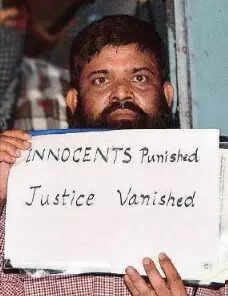
“No One Killed 200 People?”: Mumbai Families Shattered by 7/11 Acquittal After 19 Years
Mumbai: Nineteen years have passed since the tragic evening of July 11, 2006, when seven coordinated bomb blasts ripped through Mumbai’s suburban trains during peak hours. Over 200 lives were lost, more than 700 injured, and countless families left broken. On Monday, those still carrying the scars—both visible and invisible—were forced to relive their pain as all 12 men accused in the case were acquitted by the Bombay High Court.
For many families, it was not just a legal verdict—it felt like the final betrayal.
“Then Who Did It?”
Priti Sawant, who became a quiet symbol of the 7/11 tragedy, remained silent after the ruling. Her husband, Parag Sawant, slipped into a coma after the blast and passed away nine years later in 2015. Priti, now working at Bhayander station with Western Railway, chose not to comment—perhaps because there’s nothing left to say. Her daughter, born after Parag’s injury, never saw her father awake.
“We Named Our House After Him… And Now This”
Harshal Bhalerao was just 23 when he boarded a train to Andheri for his first day of work. He never returned. On Monday, his parents stood in disbelief. “We called our home ‘Harshal 7/11’ in his memory,” said his father Yashwant. “Now they tell us no one is guilty? What do we tell our daughter who now carries the burden of being our only child?” His mother, Saguna, echoed a sentiment shared by many: “My son is gone. Justice should have stood by him, at least.”
“If They Didn’t Do It, Who Did?”
Mahendra Pitale, who lost his arm in the blasts, expressed disbelief. “We were told justice was coming. We believed in it. Now we’re being asked to believe no one was responsible?” Pitale, who works for the railways, has had to replace seven prosthetic limbs in the past two decades—each expensive, each a reminder.
“Justice Died Today”
Chirag Chauhan, a chartered accountant who survived with a severe spinal injury, took to social media to express his grief:
“No one killed 200 people & injured 700… I may have forgiven, but the law has failed us. Today, justice was buried.”
“We Lost Our Pillar. The Court Took Away the Ground Beneath Us”
Vrindesh Seksaria was more than a brother to Vishakha—he was her support system. “We lost him in the blast, and then our parents during COVID. I’m alone now. And this verdict… it’s like losing him all over again,” she said, calling for the case to be reexamined.
“Some Memories Refuse to Fade”
Subhash Saboo lost his father, Nathmal, who never returned from his daily commute to Malad. “I’ve tried for 20 years to forget that evening. But today, the pain resurfaced—sharper than ever.”
Rishi Bobra, who spent a month in ICU after the blasts, has chosen to stay quiet. “I’ve moved on. But the system hasn’t,” he said.
“Are Commuters to Blame Now?” Harish Pawar, who was impaled by a train rod during the attack, voiced his outrage:
“What message does this send? That people going to work are responsible for being victims? How can evidence that led to conviction once be rejected now?”
“My Father Left for Work. He Never Came Home”
Raniya D’Souza, now an adult, was only six when her father, Manuel, died in the Matunga blast. “We were left emotionally and financially broken. My little brother doesn’t even remember him.” She now works for Western Railway—a job that helped her family survive but couldn’t heal the loss.
“If They Walk Free and Harm Again, Who Pays the Price?”
Hansraj Kanojia, who lost a leg in the attacks, urged a reinvestigation. “If these men didn’t do it and the real culprits are still out there, what’s stopping another 7/11?”
Families Seek Supreme Court Review
On Monday evening, BJP leader Kirit Somaiya met with survivors including Pitale and Kanojia at Mantralaya, urging the Maharashtra government to challenge the verdict in the Supreme Court. The message was clear: this story cannot end in silence.
💬 Final Word: A Verdict, Not a Closure
For many, the 7/11 blasts were not just an act of terror—they were a turning point. Monday’s verdict didn’t just question evidence—it reopened wounds, shattered trust, and left families asking the one question no court has yet answered:
“If not them, then who?”

